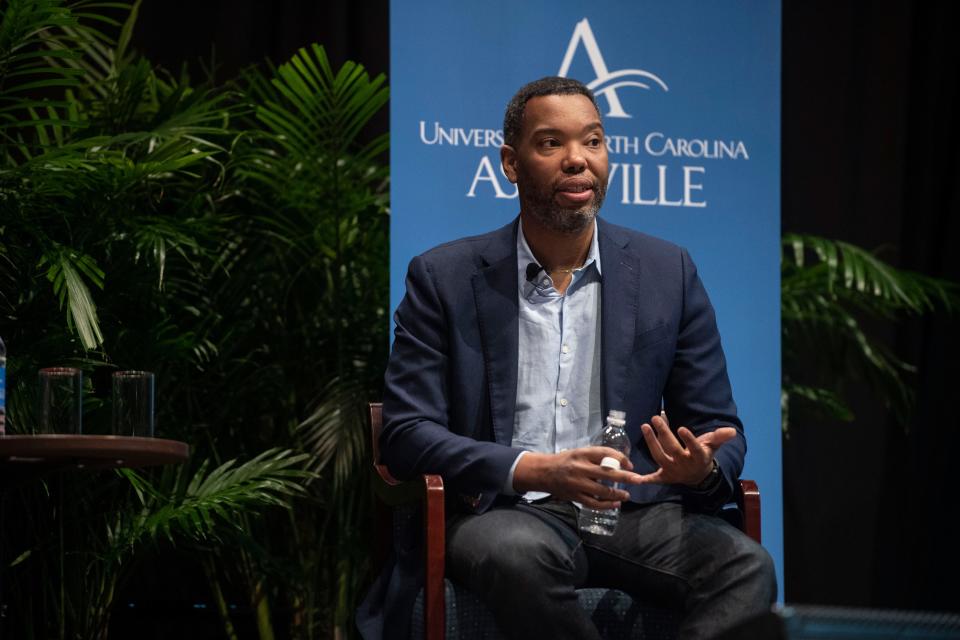South Carolina school deprives its youth by excluding unsettling truths
I am becoming a fan of Ta-Nehisi Coates, whose nonfiction book "Between the World and Me" has been in the news lately.
I picked up an e-copy after reading in the Washington Post that a veteran teacher in South Carolina was required to cease teaching Coates’ book in lessons she’d taught yearly to high school students in her AP English classes.
Two students had complained, using language adapted from a Georgia law that, prohibits lessons that teach that “an individual should feel discomfort, guilt, anguish or any other form of psychological distress … whether consciously or unconsciously.” Iowa law uses similar wording regarding training of educators and curriculum.
Too bad. Coates’ intention — his hope — was that readers would feel empathy, not guilt or anguish, for the personal experiences he chooses to share.
Too bad too for all South Carolina’s youth. Too bad for our nation’s collective recollection of unsettling truths. Too bad for educators whose professional judgement is undermined — by removing books like this nonfiction classic.
A couple of weeks ago, Ketanji Brown Jackson, the newest U.S. Supreme Court justice, was the keynote speaker at the 60th anniversary of the Ku Klux Klan bombing that killed four young girls at the Sixteenth Street Baptist Church in Birmingham, Alabama. Jackson called on us as a nation to remember past truths, even if ugly or disturbing. She’s right.
Coates crafts his book as a letter to his rising 15-year-old son, writing, “I have sought the answer (to the question of racism) through my reading and writings, through the music of my youth, through arguments with your grandfather, with your mother. I have searched for answers in nationalist myth, in classrooms, out on the streets, and on other continents.”
The question, says Coates, “is unanswerable, which is not to say futile. The greatest reward of this constant interrogation, of confrontation with the brutality of my country, is that it has freed me from ghosts and myths.” Coates’ message to his son is simple: BE WOKE.
The book was adapted for a theatrical production and staged in New York’s Apollo Theater. After a successful theatrical run, HBO turned Coates’ book into a 2020 film featuring Yara Shahidi, whose role gave her a chance to portray an awakening. “I’m a teenage girl who’s coming of age in a time in which she is aware of the slanted and unfair portrayals of the civil rights movement,” Shahidi says. “You see (my character) coming to another level of awareness through her introduction to Malcolm X.”

As Atticus Finch in "To Kill a Mockingbird" said to his daughter: “First of all, if you can learn a simple trick, Scout, you’ll get along a lot better with all kinds of folks. You never really understand a person until you consider things from his point of view … until you climb into his skin and walk around in it.”
Iowa’s mostly white student body should demand challenges from talented Black authors like Coates. He was not included among the authors on the infamous list of 374 books (later pared to 65) the Urbandale school district felt could violate Iowa’s new anti-book-reading laws.
As you might guess, a Black writer who is as direct, blunt, and elegant as Coates has his critics, some saying he’s a Black Nationalist, others sending death threats. Gov. Kim Reynolds and her Moms for Liberty allies would likely consider Coates too harsh, too explicit, too disturbing for students’ tender eyes, even if they are in an AP English class for high school seniors, and already of voting age and registered with the Selective Service.
Reynolds must fear that public schools will indoctrinate students to be “woke” or “compassionate progressives,” or maybe she’s afraid reading books will reenergize the passion for justice that sent people into the streets following the murder of George Floyd. She’s making a tragic mistake, one hard to undo. If we don’t mean it, we should stop reciting the Pledge of Allegiance, especially the part about “liberty and justice for all.”
Gerald Ott lives in Ankeny. He taught high school English in Keokuk before Ta-Nehisi Coates was born. Back then, high school students read and discussed, without objection, “Cry the Beloved Country,” a novel by South African writer Alan Paton, set in the prelude to apartheid in South Africa. Since then, Ott was a teaching and learning consultant for the state teachers union. He is a student of post-Civil War Reconstruction.
This article originally appeared on Des Moines Register: Excluding Ta-Nehisi Coates for 'discomfort' deprives youth

